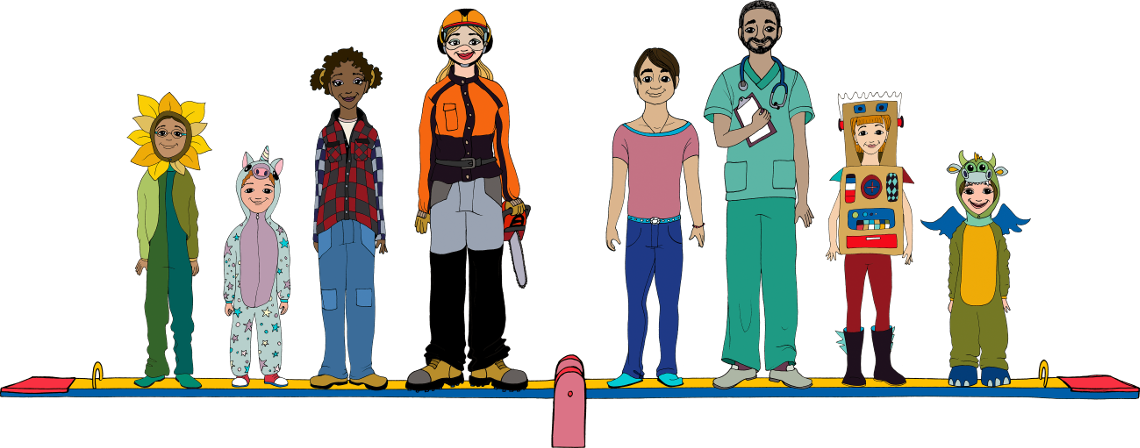Goals

Brief description of the issue
Students that embody gender stereotypes the most are the ones who dropout of school the most (RRM, 2018). In order to encourage school retention of all children, it is therefore important to break down gender stereotypes starting in early childhood, when children develop their gender identity (Boyd and Bee, 2015), and where they learn those stereotypes. This workshop aims at initiating the discussion with parents about gender stereotypes and the role they play as adults in reinforcing these stereotypes with their kids.
Building relationships with parents and extended family members
Building a relationship with parents and families and extended families is the most important strategy in supporting early learning, and is necessary if you want to be able to talk about gender stereotypes with parents and caretakers as it can be a touchy subject.
Here are a few strategies recommended by the Best Start Resource Center (2010, p. 23):
- When building relationships, be willing to share your experiences with parents.
- Consider the extended family in your efforts to support early learning.
- Be patient, as it may take time for a parent to trust you.
- Be respectful and kind to parents. It takes courage for them to seek advice or assistance.
- Maintain regular positive contact with parents. Keep them informed of events and activities via newsletters and phone calls.
Involving parents and extended family members in decision-making
A fruitful way of building relationships with parents is to involve them in making decisions. According to the Best Start Resource Centre (2010), “allowing parents to make choices about what is best for their children is a powerful method of building a good working partnership with families.” With this in mind, if your team decides to tackle gender stereotypes at your centre, make sure you involve parents and extended family members in the reflection from the beginning. You can use meetings or surveys, for instance.
In their report Founded in Culture, the Best Start Resource Centre (2010, p. 14) shares some suggestions on “how to involve parents, extended family, and the community in early childhood education programs. Some suggestions for involving parents and community include:
- asking parents what they expect their children to learn during registration;
- asking parents or grandparents if they would be willing to share songs, stories, and other cultural knowledge;
- hosting regular open houses to update parents on their children’s progress;
- designating a staff member as family involvement worker who can do home visits to help families with their child’s transition;
- producing a monthly newsletter and calendar for parents; and
- inviting community leadership to all events and ceremonies and keep them informed of new services.”
Other strategies recommended include (Best Start Resource Centre, 2010, p. 24):
- Allow parents to identify their own needs and priorities and help them figure out ways to address the challenges they face.
- Present options to parents and let them take time to decide what is best for their child.
- Encourage parents to be involved in making decisions about programming.
- Invite parents to participate in activities such as field trips and fundraising.
- Keep parents informed by talking to them or through a newsletter.
Organizing a workshop with First Nations parents
If you wish to organize a more formal workshop for parents on gender stereotypes, the Best Start Resource Centre (2015) has put together a guide that might help you: A Facilitator’s Guide: Planning a First nations Workshop for Parents. You can also design your own workshop according to your community’s needs. You will find below a few activities that could be used to talk about gender stereotypes with parents frequenting your centre.
Talking Circle
Once you were able to build a strong relationship with parents and are able to work with them as co-educators of their child, you are ready to organize a more “hands-on” activity on gender stereotypes.
To introduce the subject, start your activity by asking parents to sit in a circle. Explain that you will ask them to reflect individually on a few questions, and then will invite them to share, if they want, what reflections came up to their mind when you were asking the questions.
Questions:
- From what you know about traditional Mi’gMaq society, what were the roles of men, women and Two-Spirits persons? What value was given to each of these roles?
- How did European contact and colonization change these roles? How do you feel about that change?
- What are the current gender stereotypes you see in our community?
Make sure you are sitting with parents, as a part of the circle yourself. Pass on the talking stick to your left, in the direction the sun travels. Parents can choose to talk or to pass on the stick and listen. Go on for a few rounds, so if someone stays silent at first, he or she has the opportunity to speak again.
When it is your turn to speak, you can give a few examples you’ve noticed in your personal life or at the centre to feed the discussion. For example, you heard a little girl from your group tell a boy he couldn’t play dolls with her because he was a boy, or you were told when you were young that you couldn’t become a fisherman because you were a woman.
Household chores: an honest conversation
Family is the first socialization agent for the child: it is where they learn most of the roles associated with boys and girls. Parents often serve as gender role models for children, therefore it is important to show them how men and women can be equal, and household chores are a good start.
Start the activity by playing the following video:
After watching the video together, ask parents to comment on it and to share how they share domestic chores at home. Keep going by telling them the following:
Even if children, at home, see their parents equally sharing domestic chores (cleaning up, taking care of the kids, etc.), they will still associate women and mothers with these chores because the majority of the commercials, books and other media still do this association. This is why it is important to not only be a positive role model for your children, but also to challenge stereotypical representations you see daily with your child.
Behaviours and emotions
Gendered socialization reinforces gender stereotypes. For example, anger is more accepted when expressed by boys. During childhood, boys learn mainly how to express their anger (and less often other emotions), which can further down the road hinder their abilities to communicate (Ducret & Le Roy, 2012). We also notice that adults, when talking to girls, have conversation topics more oriented towards emotions. Adults also tolerate crying more with girls than with boys (CSF, 2016). At an age as early as 7 years old, girls are able to name synonyms to a greater variety of emotions than boys can, the only emotion to which they can find more synonyms than girls being “anger” (BBC, 2018). It is therefore important to let children, especially boys, express their emotions and to help them control these emotions. The following video shows a great strategy to help toddlers learn how to regulate their emotions:
If you are looking for a more in-depth article about how gender stereotypical parenting can influence early childhood social development, have a look at this research update by the Child & Family Blog. You will also find below a downloadable document titled Challenging gender stereotypes in the early years: the power of parents. This recent (2018) evidence paper will be of great use for parents wanting to know more about this subject.
Document
References
BBC (2018). No More Boys And Girls: Can Our Kids Go Gender Free?, Outline Productions. https://www.bbc.co.uk/mediacentre/proginfo/2017/33/no-more-boys-and-girls
Best Start Resource Centre. (2010). Founded in Culture: Strategies to Promote Early Learning in First Nations Children in Ontario. Toronto, Ontario, Canada. https://resources.beststart.org/wp-content/uploads/2011/01/K13-A.pdf
Best Start Resource Centre. (2015). A Facilitator’s Guide: Planning a First Nations Workshop for Parents. Toronto, Ontario, Canada. https://resources.beststart.org/wp-content/uploads/2019/01/K66-A-1.pdf
Boyd, D. et Bee, H. (2015). L’enfance: Les âges de la vie, édition abrégée.
Conseil du statut de la femme (2016). Avis: L’égalité entre les sexes en milieu scolaire, Gouvernement du Québec. https://www.csf.gouv.qc.ca/wp-content/uploads/avis_egalite_entre_sexes_milieu-scolaire.pdf
Ducret, V. & Le Roy, V. (2012). La poupée de Timothée et le camion de Lison. Guide d’observation des comportements des professionnel-le-s de la petite enfance envers les filles et les garçons. Le deuxième Observatoire, Genève. http://www.2e-observatoire.com/downloads/livres/brochure14.pdf
Our Watch (2018). Challenging gender stereotypes in the early years: the power of parents. Melbourne, Australia: Our Watch. https://www.ourwatch.org.au/getmedia/e42fe5ce-8902-4efc-8cd9-799fd2f316d7/OUR0042-Parenting-and-Early-Years-AA.pdf.aspx?ext=.pdf
Réseau Réussite Montréal (2018). “Pour une égalité filles-garçons en persévérance scolaire”, Réseau Réussite Montréal – Dossiers thématiques. http://www.reseaureussitemontreal.ca/dossiers-thematiques/egalite-filles-garcons-reussite-scolaire/
UN Human Rights, 2019. “Gender stereotyping”, United Nations Human Rights – Office of the High Commissioner. https://www.ohchr.org/EN/Issues/Women/WRGS/Pages/GenderStereotypes.aspx
Yale University (2016). Helping Toddlers Regulate Emotions. https://www.youtube.com/watch?v=-H14NNUYwVc
